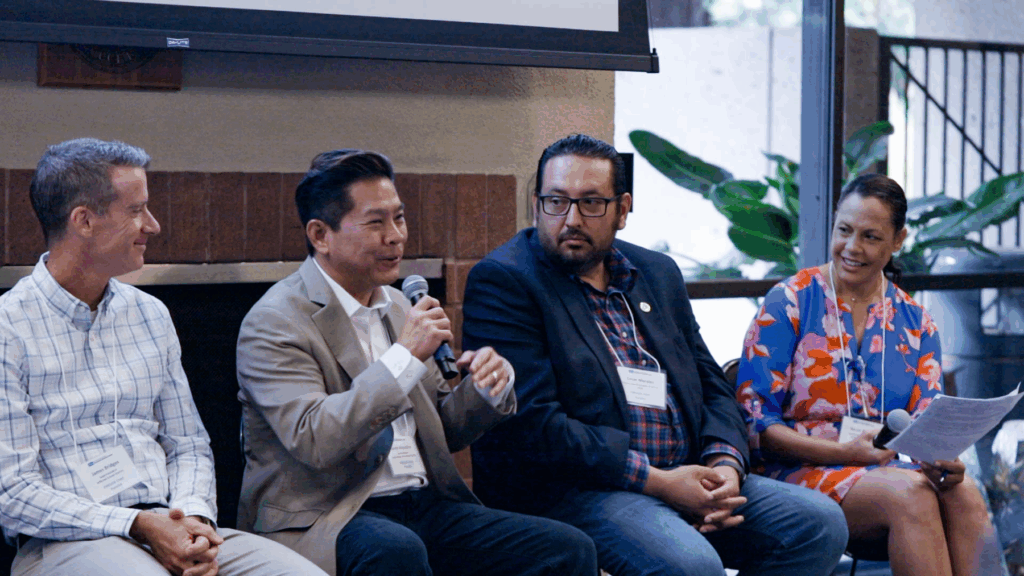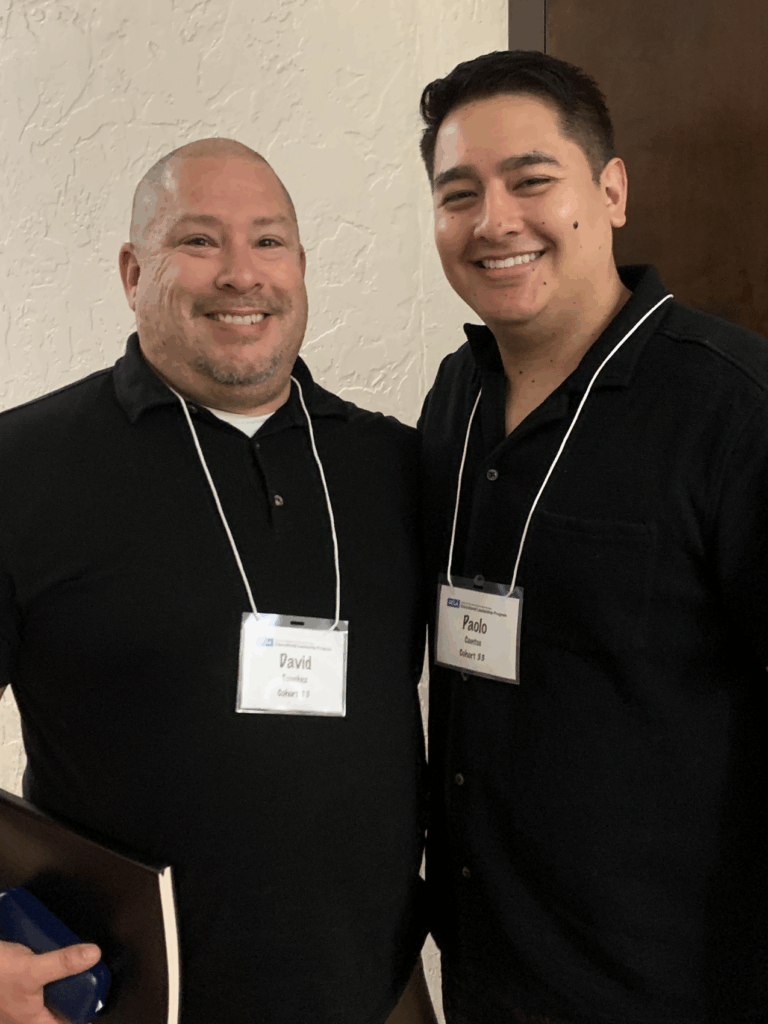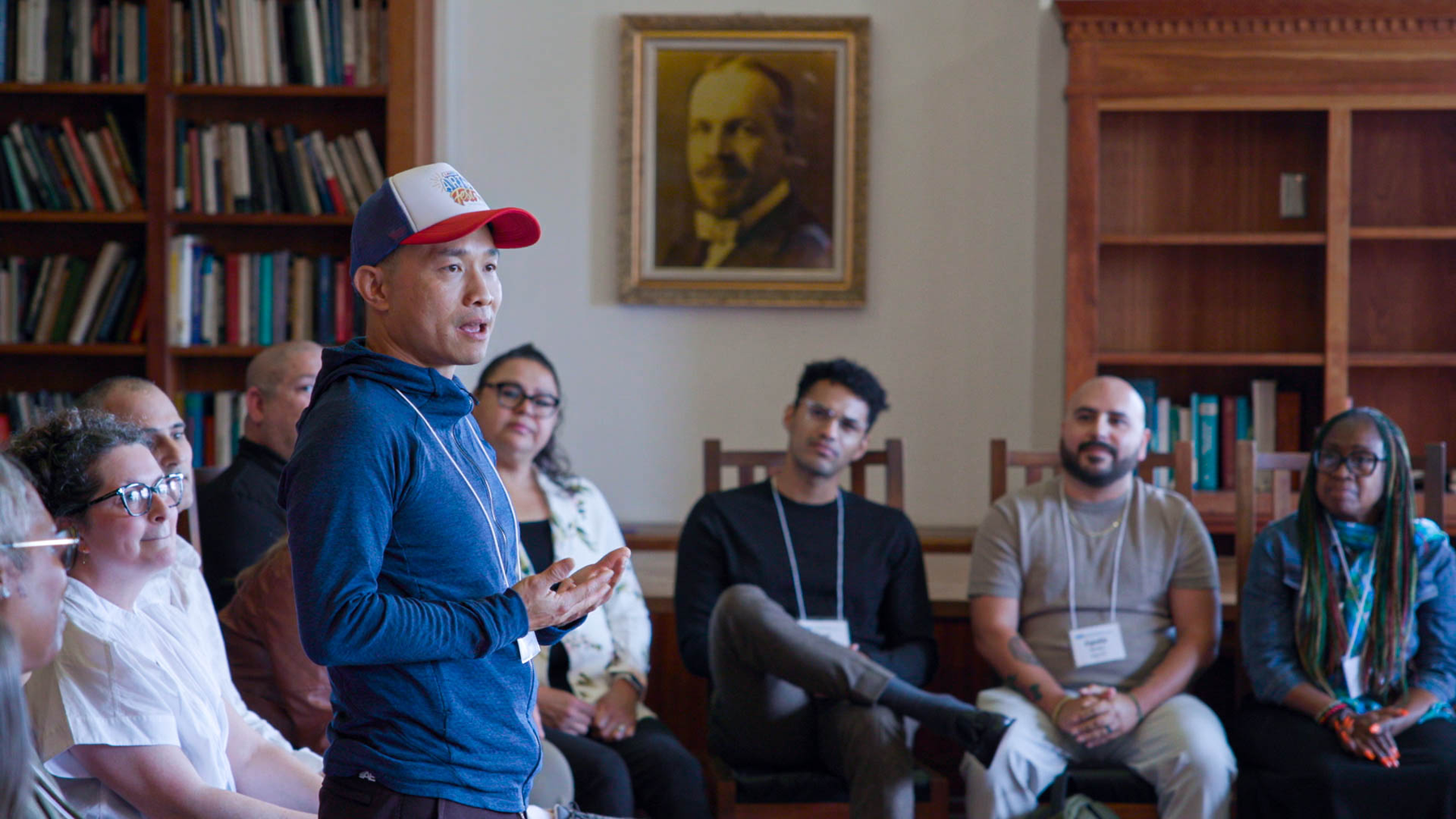New cohort of educational professionals looks forward to opportunities of learning, research, reflection, and community.
Committed to promoting innovative and change-oriented educational leaders, the UCLA Educational Leadership Program (ELP) embodies the public research and service mission of the University and the social justice vision of the UCLA School of Education and Information Studies. The program’s commitment to creating equitable and accessible PreK-16 opportunities in urban settings is centered on preparing educational leaders who resist accumulation and lead with care, repair, and shared humanity. ELP students disrupt and dismantle inequitable systems while building parallel structures that sustain communities grounded in justice, belonging, and collective well-being.
This was evident at the event, “UCLA ELP TK-12 Leadership Symposium: Resilient Leadership in Our Current Context,” which took place at UCLA, featuring a panel of ELP alumni. The event was co-hosted by UCLA ELP, the ELP Alumni Advisory Board, WestEd, the University Credit Union, and the California Credit Union.
Travis Bristol, PhD, associate professor of teacher education and education policy at UC Berkeley, delivered the keynote address. ELP alumni speakers included James Bridges (Cohort 7), superintendent, Jefferson School District; Cristina de Jesus (Cohort 14), president and CEO, Green Dot Public Schools; David Miyashiro (Cohort 10), superintendent, Cajon Valley Unified School District; Cesar Morales (Cohort 11), Ventura County superintendent of schools; and Nicole Wesley (Cohort 13), superintendent, Redondo Beach Unified School District.

Tonikiaa Orange, EdD, who serves as ELP director, says the event provided a range of perspectives and expertise in addressing the most pressing issues across education today, such as working with school boards within the social-political context, artificial intelligence, the impact of federal funding cuts, and the certification of early childhood teachers.
“ELP graduates are leading school districts across California, and they have a really strong pulse on the needs, how to move forward, how to think about issues during these difficult times,” Orange says. “Their drive and passion for what they do is still deeply rooted in justice…even though it is a very difficult time to be an educational leader. They wouldn’t want to be anyplace else.”
UCLA alumnus Ngay Tang (’02, B.S., microbiology, minor in education studies; ’04, MEd, Teacher Education Program; ’16, MEd, Principal Leadership Institute) is the founding principal of Eastside High School in LAUSD. He entered ELP this fall as a member of Cohort 33.
“Being a graduate student again is going to help me become a better principal,” he says. “I think that’s the reason ELP requires students to be full-time [professionals], because that allows us to be practitioners as well as researchers. I know my school will be better, my community will be better for it, because I’m in ELP.”
Tang’s research will focus on closing the equity gap for underrepresented students aspiring to become professionals in the STEM fields; he says that Eastside High School, which is located in East LA and offers a Gold-Certified Linked Learning Engineering Design pathway, is “the perfect school [at which] to conduct my research.”
“At my school we have about 20% ELs, and half of those are newcomers,” says Tang. “They don’t speak English at all. I told the students that I didn’t speak English when I came here [or] when I started school. So, you don’t have to speak English as a first language, in order to rise to the position of a principal or to even become a professional. My message to my students is that you’re just as good as anybody else, regardless of your background, income, or zip code.”
Paolo Cantos, website content administrator in the UCLA Ed&IS Office of Communications, also joined Cohort 33 this fall. His decision to enter ELP was a culmination of his experiences in higher education administration. His previous roles as senior marketing and communications strategist at the USC Career Center and interim senior communications specialist for the USC Office of the Vice President of Student Life solidified his decision to pursue a doctorate.
“After completing my MPA at Cal State Northridge in 2022, I had a feeling I’d pursue a doctorate, but I wasn’t sure until at USC, I was surrounded by folks with EdDs or PhDs,” he says. “I was working closely with them and able to see the impact they’re able to have in their positions. After being immersed in that environment, it became more and more apparent that what I wanted to do with my career needed a doctoral degree.”
Cantos aspires to become a vice president of student affairs at his local community college.
“Reading the job description of a vice president of student affairs just seemed like everything that I want to do in terms of an opportunity to make a positive impact on a large group of people,” he says. “A majority of community college students are low-income, first-generation, local residents, and it connected with what my upbringing was, and what my higher education experience has been, and still is.
“It seems like a perfect position to impact a lot of people who maybe have a similar story to mine,” says Cantos. “I’ve had some things break the right way for me. If I could be in a position like a vice president of student affairs, an associate dean, or a dean of student affairs or academic programs … there’s a better chance I could help those students’ key moments break the right way for them.”
Tang says that his ELP experience so far has been “inspiring,” and that the ELP symposium helped him to make connections with like-minded colleagues.
“I feel so humbled to be in a company of such distinguished and accomplished scholars,” he says. “It was great to connect with people that went through the program. They talked about their experiences, they gave me some tips on how to manage my time, my coursework, and professors that I should reach out to that might support my research interests.
“I hope eventually I will be that alum to come back and share my insight and experiences with future ELP students,” Tang says. “I feel like I have a new support network. I’m going back [to UCLA] for growth, for inspiration, for support. I think through the ELP program, I’m going to get all that.”
Cantos also appreciates the supportive environment of ELP.
“I had the privilege to work at UCLA Ed&IS for about five years before I went to work at USC,” he says. “In 2022, I had the chance to cover social media for Ed&IS commencement, and in that experience, I got to see all the different cohorts of the graduating programs.
“ELP stood out as such a tight-knit group, like a community, a perfect example of everything [you’d] want from a cohort model of a graduate program,” says Cantos. “The discussions and different courses that they offer [span] a broad range that really leans on the importance of social justice, diversity, and cultivating positive cultures and organizational change in workplaces, especially in education.”

Tang says that returning to his alma mater for his EdD was largely based on having had Orange as one of his instructors while in the Principal Leadership Institute program, and on the education he received.
“UCLA is really the best option as far as I’m concerned, [with] some of the best research when it comes to asset-based and critical theories, social justice leadership, and coaching frameworks,” he says. “A lot of that work connects to what I’m currently doing. It prepared me to be a school leader, leading for justice in underserved communities.
“And reconnecting with Dr. Orange – she’s one of the main reasons I decided to apply this year, when I found out that she’s going to be leading the program,” says Tang. “I know she has a passion for social justice and for supporting equity-driven teachers and leaders in the field of education, and I hope to learn from her.”
Cantos has reconnected with a former mentor through ELP as well, albeit one from much earlier in his education.
“We did a meet-and-greet for our program, and I knew some other folks that were already in the program, having spoken to them before,” he says. “But a pleasant surprise was that one of my former high school teachers is in the program with me, Topi Sanchez. He is now a principal at one of the local middle schools where I’m from in Oxnard. He was my English teacher, and I just thought that that was a very emotional, full-circle moment. It was an emotional moment too, for him, that he got to see where one of his students ended up.
“Knowing him as a 16-year-old kid [back then] … he seemed so much older to me and a role model, but he was also just starting his career, from being a sophomore English teacher to now becoming a principal and getting his doctorate,: says Cantos. “It’s cool how that perspective has shifted now that I’m older, and we happen to cross paths again. I look forward to being able to go through this journey with him.”
Cohort 33 is the first one that Orange, who took the helm as ELP director in late 2024, will support through their doctoral journeys.
“I am excited to usher in my first cohort,” says Orange. “I have asked them to use this journey as a time to dream, reflect and be still. It is revolutionary for educators to be still, because their jobs are urgent, high stakes, nuanced and deeply personal.
“If we don’t have time for our educators to be still and to reflect, and to enjoy the journey and the learning process, how could they actually lead in that way?”
Above: Ngay Tang, founding principal at Eastside High School and a PLI alum, joined Cohort 33 of the Educational Leadership Program this fall. Photo by Zach Green Productions
